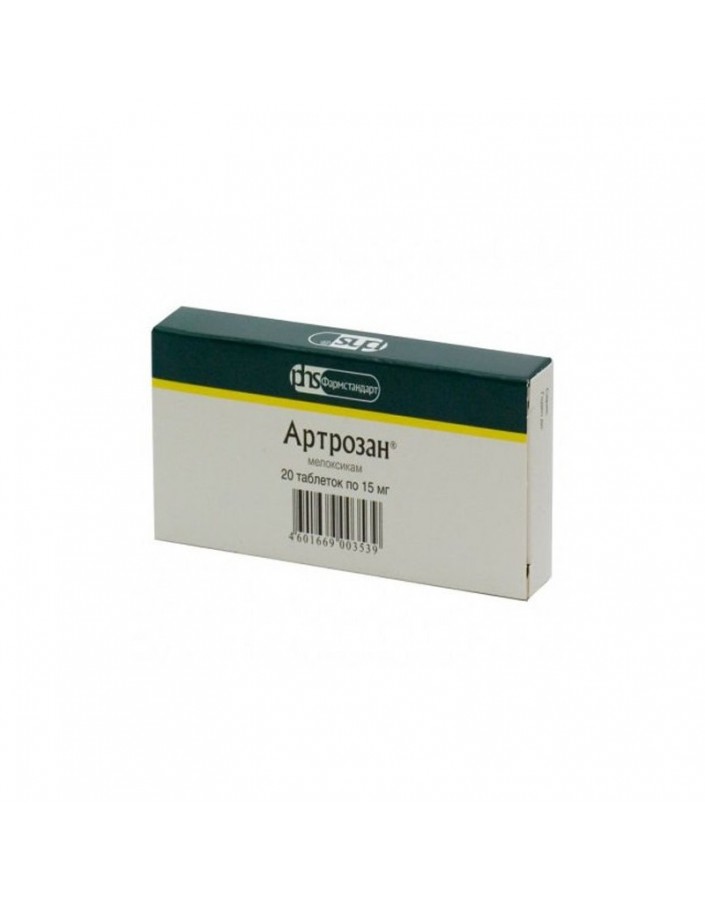



ARTROZAN PILLS 15 MG - 20TABS

Security policy (edit with Customer reassurance module)

Delivery policy (edit with Customer reassurance module)

Return policy (edit with Customer reassurance module)
One pill Artrozan contains - meloxicam 7.5 mg or 15 mg
Excipients: potato starch, lactose monohydrate, povidone, trisodium citrate, Magnesium stearate, colloidal silicon dioxide;
10, 20, 30 or 50 pills per pack.
pills from light yellow to yellow color of a flat-cylindrical form with a facet and risky. Minor marbling is allowed.
Pharmacological group
nonsteroidal anti-inflammatory drug
Artrozan - nonsteroidal anti-inflammatory drug with analgesic, antipyretic and analgesic effects. The anti-inflammatory effect is associated with inhibition of the enzymatic activity of cyclooxygenase-2 (COX-2), which is involved in the biosynthesis of prostaglandins in the area of inflammation. To a lesser extent, meloxicam acts on cyclooxygenase-1 (COX-1), which is involved in the synthesis of prostaglandin, which protects the mucous membrane of the gastrointestinal tract and is involved in the regulation of blood flow in the kidneys.
Symptomatic treatment of osteoarthritis, rheumatoid arthritis, ankylosing spondylitis (ankylosing spondylitis) and other inflammatory and degenerative diseases involving pain syndrome.
Hypersensitivity to any component of the drug;
- Aspirin bronchial asthma;
- exacerbation of gastric ulcer and duodenal ulcer;
- severe renal failure (if hemodialysis is not performed);
- severe liver failure;
- children under the age of 15 years;
- pregnancy and lactation.
Carefully the drug should be used in elderly patients, in patients with erosive and ulcerative lesions of the gastrointestinal tract in history.
Artrozan taken orally with food once a day.
Rheumatoid arthritis: 15 mg per day. After achieving a therapeutic effect, the dose can be reduced to 7.5 mg per day.
Osteoarthritis: 7.5 mg per day. With the ineffectiveness of the dose can be increased to 15 mg per day.
Ankylosing Spondyloarthrosis: 15 mg per day.The maximum daily dose should not exceed 15 mg. In patients with an increased risk of side effects, as well as in patients with severe renal insufficiency who are on hemodialysis, the dose should not exceed 7.5 mg per day.
Organs of the digestive system: nausea, vomiting, abdominal pain, diarrhea, constipation, flatulence, erosive and ulcerative gastrointestinal lesions, perforation of the stomach or intestines, Gastrointestinal bleeding (latent or overt), increased activity of “liver” enzymes, hepatitis, colitis, stomatitis, dry mouth, esophagitis.
The cardiovascular system: tachycardia, increased blood pressure, feeling of "tides".
Respiratory system: exacerbation of bronchial asthma, cough.
Central nervous system: headache, dizziness, tinnitus, disorientation, confusion, sleep disturbance.
Genitourinary system: edema, interstitial nephritis, renal medullary necrosis, urinary infection, proteinuria, hematuria, renal failure.
Organs of vision: conjunctivitis, blurred vision.
Integuments: itching, skin rash, urticaria, erythema multiforme exudative (including Stevens-Johnson syndrome), toxic epidermal necrolysis (Lyell's syndrome), increased photosensitivity.
Blood system: anemia, leukopenia, thrombocytopenia.
Allergic reactions: anaphylactoid reactions (including anaphylactic shock), swelling of the lips and tongue, allergic vasculitis. Others: fever.
With simultaneous use with other nonsteroidal anti-inflammatory drugs (as well as with acetylsalicylic acid) increases the risk of erosive and ulcerative lesions and gastrointestinal bleeding;
With simultaneous use with antihypertensive drugs, it is possible to reduce the effectiveness of the latter;
With simultaneous use with lithium preparations, the development of lithium cumulation and an increase in its toxic action is possible (it is recommended to control the concentration of lithium in the blood);
With simultaneous use with Methotrexate, the side effect of the latter on the hematopoietic system is enhanced (the risk of anemia and leukopenia, periodic monitoring of the complete blood count is shown);
With simultaneous use with diuretics and cyclosporine increases the risk of developing renal failure;
With simultaneous use with intrauterine contraceptives may reduce the effectiveness of the latter;
With simultaneous use with anticoagulants (heparin, ticlopidine, warfarin), as well as with thrombolytic drugs (streptokinase, fibrinolysin) increases the risk of bleeding (requires periodic monitoring of blood clotting).
With simultaneous use of Kolestiramine, as a result of binding meloxicam, its excretion through the gastrointestinal tract increases.
Symptoms: impairment of consciousness, nausea, vomiting, epigastric pain, gastrointestinal tract, bleeding, acute renal failure, liver failure, respiratory arrest, asystole.
Treatment: there is no specific antidote; With an overdose of the drug should be a gastric lavage, taking activated charcoal (within the next hour), symptomatic therapy. Cholestyramine accelerates the excretion of the drug from the body. Forced diuresis, alkalization of urine, hemodialysis are ineffective due to the high association of the drug with blood proteins.
Care should be taken when using the drug in patients with a history of peptic ulcer or duodenal ulcer, as well as in patients undergoing anticoagulation therapy. These patients have an increased risk of ulcerative erosive diseases of the gastrointestinal tract.
Caution should be exercised and monitor renal function when using the drug in elderly patients, patients with chronic heart failure with symptoms of circulatory failure, in patients with cirrhosis of the liver, as well as in patients with hypovolemia as a result of surgical interventions.
In patients with renal failure, if creatinine clearance is more than 25 ml / min, no adjustment of the dosage regimen is required.
In patients on dialysis, the dosage of the drug should not exceed 7.5 mg / day.
Patients taking both diuretics and meloxicam should take a sufficient amount of fluid.
If during treatment there are allergic reactions (itching, skin rash, urticaria,photo-sesibilization) it is necessary to consult a doctor with a view to deciding whether to stop taking the drug.
Vehicle control, maintenance of machines and mechanisms
The use of the drug may cause the occurrence of undesirable effects in the form of headache and dizziness, drowsiness. You should abandon driving and maintenance of machines and mechanisms that require concentration.
In a dry and dark place. Keep out of the reach of children.
Shelf life - 2 years.
On prescription
Artrozan